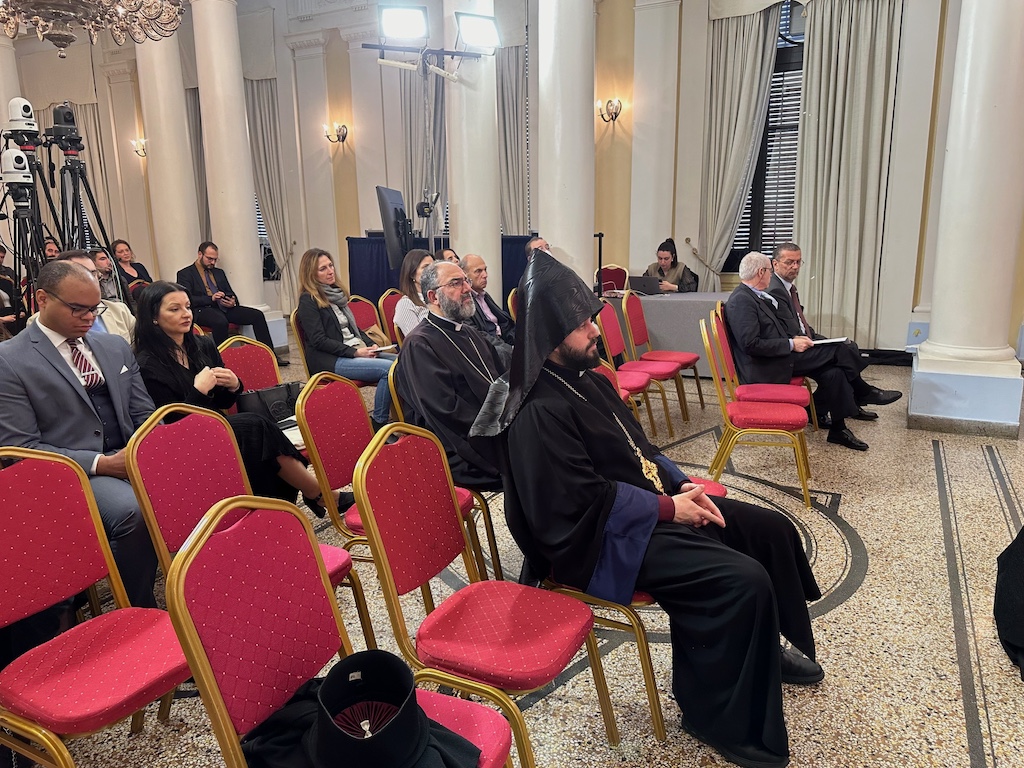4th Conference on Religious Diplomacy: Day 2 proceedings


The second day of the 4th Conference on Religious Diplomacy, organised by the Institute of Foreign Affairs and the “Church and Culture” Laboratory of the Theological School of the National and Kapodistrian University of Athens, began with a focused dialogue on Interreligious Relations in the Middle East. This pivotal discussion, supported by orthodoxtimes.com as the communication sponsor, aimed to shed light on the intricate dynamics shaping religious interactions within the region.
Metropolitan of Cameroon: Wagner backs Russia’s pseudo-exarchate in Africa
In his presentation, Metropolitan Gregory of Cameroon emphasised the ongoing need for the Church to embody the sacrament of Christ by engaging in continual self-reflection. And this is can been deemed as something hopeful. “The fact that the mission has a leading role in humanitarian teaching initiatives is hopeful. The mission of the Patriarchate of Alexandria is not limited to spreading the gospel. The Patriarchate creates schools, organises food distributions to refugees, builds prisons, nursing homes, hospitals, and tries to inform on diseases and prevention. But this does not mean that the Church is not victim of organised fraud,” the Metropolitan added.
As he explained, along the borders of present-day African states, there exists a significant diversity of ethnicities and races, each distinct and heterogeneous from the others. Cameroon for example has 230 different tribes, speaking different languages and having different culture, traditions, ways of hunting, etc. Many tribes have enslaved other tribes.
“Colonialism did benefit them,” emphasises Metropolitan Gregory, “since it led to the abolition of slavery through creating equal societies.” Yet, deep-seated rivalries of the past still hold sway. There are those who were former slave-owners and the rest who were former slaves. The former are traditionalists who are against white people, culture and Christianity and accuse them of the abolition of slavery. The latter are slaves who are seek progress, accept new elements in their traditions, and have a more European orientation. They believe that “if Europeans hadn’t come to Africa, they would still be slaves,” the Metropolitan of Cameroon added.
He acknowledges that missionary efforts have been instrumentalised many times. “Take for example the invasion of Russia. The Russian pseudo-exarchate not only exerts economic influence to sway African priests but also backs the invasion through its military presence. The emergence of Wagner, without any reaction from the international community, soon became a decisive factor in the change of governments in African states. Following the death of its leader it was absorbed by the Russian army. In other words, there’s a Russian military presence in Africa, yet no significant reactions have been seen. We knew that the “Exarchate” had the assistance of Wagner in the past but who backs it now? The Russian army?” he wondered.
Archbishop Angaelos: Christians must remain at the discussion table
The Coptic Archbishop of London, Angaelos, stressed that although events may be driven by geopolitics, there are always religious overtones. “Pressure is exerted upon us to find a solution, to go ahead with reconciliation efforts. People have used religious scriptures to legitimise destruction. The only way to stop this is through dialogue with other religions. In my experience, it is crucial to know what we’ll be discussing. In London we have set up a religious freedom office. We Christians must remain at the discussion table. There is a lot of debate in the Middle East about tolerance. We should all respect each other. When we see a community being persecuted, we can be sure that others will be too. We have to be united.”
Noam Katz, Ambassador of Israel to Athens: We have responsibility to find alternative
The Israeli Ambassador to Athens spoke at the 4th Conference on Religious Diplomacy, referring to the experience he gained from his own country. “The Middle East is home to many religious groups and, therefore, it has a long history. One of the biggest challenges we face is extremism. This is a significant challenge for our region and for the wider region as well. It is noteworthy that 22% of Israel is not Jewish. In other words, 8.1% are Muslims, while Christians are a small percentage of the population. Israel has the only Christian community in the Middle East that has been growing,” he said.
Then, he added, “Every democratic country must set priorities based on what is happening. On October 7, a war against Israel began. Hamas has launched an attack against our army, against children, women, infants. This organisation took hostages. They still hold some of them hostages in Gaza. We thought that we would find a solution before Ramadan. Hamas chose another path, tried to increase tensions and have sought to inflame religious sentiments. But Israel decided to allow Muslims to celebrate Ramadan as usual. It is the most important celebration for them, for the faithful, for pilgrims who come from other countries. We will be assessing the situation daily to guarantee security and, therefore, to preserve freedom of worship. The Christian Easter will be celebrated too, with some restrictions on the number of believers allowed to be inside the temples.”
He concluded, “The conflict we have with the Palestinians is an ethnic one; In other words, it is a conflict between Israelis and Palestinians. However, we believe that political conflicts can be resolved through dialogue. Sadly, there are organisations like ISIS and Al-Qaeda, or countries like Iran, promoting extremism in our region and sometimes spreading the idea of a religious war. Thus, we have the responsibility to find an alternative.”
Source: orthodoxtimes.com







